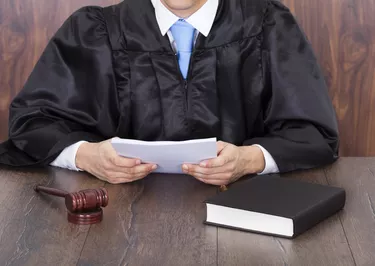
If you enter into a contract or similar financial obligation and then file for bankruptcy, your lender or creditor may file a contingent claim against your estate. This claim, which is dependent on the occurrence of some future event, can be addressed by the court in a number of ways.
Certain Conditions Required
Video of the Day
A contingent claim is one for which there is a preceding condition, or triggering event, that must take place in order for the debt or expense to occur. Because the event is not guaranteed to happen, the claim may or may not become valid. Contingent claims are usually filed by creditors when a debtor or potential debtor files for personal bankruptcy. The claim is handled according to state law and court precedence.
Video of the Day
Reasons to File
A creditor may file a contingent claim if it has cause to believe a triggering event may occur that would make the bankruptcy claimant financially obligated to the money. This type of situation can occur if, for example, a debtor in bankruptcy has acted as co-signer for another person's car loan financing. If the third-party borrower defaults on her loan payments, per the agreement that the debtor signed, he becomes financially responsible for repayment of the loan.
Creditor Responsibility
Unlike an absolute claim, which is automatically factored into a bankruptcy proceeding and repayment schedule when applicable, creditors must file a contingency claim with the court if they wish to retain their right to recover monies due from a debtor's estate. The creditor also must demonstrate that the required pre-condition, or triggering event, occurred, thereby making the claim valid. If the presiding court decides to treat the contingent claim as an absolute claim, the creditor receives payment in the same manner as other creditors.
Making Payment
Depending on state law, there are several ways a court can handle a contingency claim. The debtor and his attorney or representative may decide to assess the value of the claim and pay it in the same manner as an absolute claim. Likewise, the court can choose to distribute the funds from the debtor's estate as normal, while retaining the amount of funds required to pay the contingent claim, should it become valid. An estate may also be distributed to creditors, with the understanding that they are liable for payments due to on any contingent claims. Debts incurred by an estate can be paid in any manner determined suitable by a bankruptcy court.